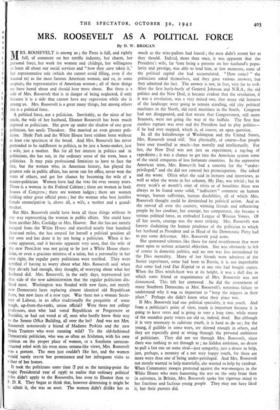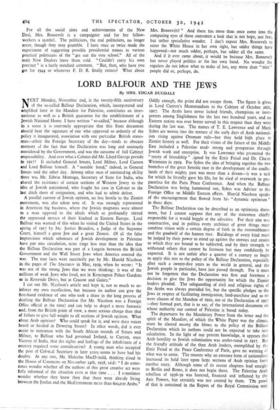MRS. ROOSEVELT AS A POLITICAL FORCE
By D. W . BROGAN A political force, not a politician. Inevitably, as the niece of her
uncle, the wife of her husband, Eleanor Roosevelt has been much exposed to politicians. She grew up under the shadow of one great politician, her uncle Theodore. She married an even greater poli- tician. Hyde Park and the White House have seldom been without at least cne specimen of the breed. And Mrs. Roosevelt has never pretended to be indifferent to politics, to be just a home-maker, just a wife, just a mother. But for all her interest in politics and in politicians, she has not, in the ordinary sense of the term, been a politician. It may pain professional feminists to have to face the fact, but the woman who, in American history, has played the greatest role in public affairs, has never run for office, never won the votes of others, and got her chance by becoming the wife of a master-politician. Women have had the vote for over twenty years. There is a woman in the Federal Cabinet ; there are women in both houses of Congress ; there are women judges ; there are women holding other great official posts ; but the woman who best justifies female emancipation is, above all, a wife, a mother and a grancl mother.
But Mrs. Roosevelt could have been all these things without in
any way representing the woman in public affairs. She could have been another Mrs. Coolidge or Mrs. Hoover. But she has not merely escaped from the White House and travelled nearly four hundred thousand miles, she has created for herself a political position all her own and has done it by not being a politician. When it be- came apparent, and it became apparent very soon, that the wife of the new President was not going to be just a White House chate- laine, or even a gracious mistress of a salon, but a personality in her own right, the regular party politicians were terrified. They were terrified cf having to worry about what Mrs. Roosevelt said when they alr..mdy had enough, they thought, of worrying about what her husband did. Mrs. Roosevelt, in the early days, represented just that side of the new administration that the regular politicians dis- liked most. Washington was flooded with new faces, not merely new Democratic faces replacing almost identical old Republican faces, but new faces of a new type. Was there not a Woman Secre- tary of Labour, in an office traditionally the perquisite of some tough, up-from-the-ranks, union official? Were there not college pi ofessors, men who had voted Republican or Progressive or Socialist, or had not voted at all, men who hardly knew their way to the Senate Office Building, all over the lot? And was not Mrs. Roosevelt notoriously a friend of Madame Perkins and the new Brain Trusters who were running wild? To the old-fashioned Democratic politician, who was so often an Irishman, with his own opinion on the proper place of women, or a Southern unrecon- nructed rebel with his even more zenana-like views, Mrs. Roosevelt was a portent. The men just couldn't like her, and the women would surely resent her prominence and her infrequent visits to either of her homes.
It took the politicians some time (I put as the turning-point the
magic Presidential year of 1936) to realise that ordinary political rules didn't apply to the Roosevelts, less even to Eleanor than to F. D. R. They began to think that, however distressing it might be to admit it, she was an asset. The women didn't dislike her as
much as the wire-pullers had feared ; the men didn't resent her as they should. Indeed, more than once, it was apparent that the President's wife, far from being a parasite on her husband's popu- larity and prestige, was able to lend him, at low moments, some of the political capital she had accumulated. "How come?" the politicians asked themselves, and they gave various answers, but they admitted the fact. The answer is not, in fact, very far to seek. After the first hurly-burly of General Johnson and N.R.A„ the old politics and the New Deal, it became evident that the revolution, if it was a revolution, was a very mixed one, that many old features of the landscape were going to remain standing, old city political machines in the North, old rural machines in the South. Congress had not disappeared, and that meant that Congressmen, still more Senators, were not going the way of the buffalo. The first fine careless rapture was over and the President had to play politics— if he had ever stopped, which is, of course, an open question.
In all the kaleidoscope of Washington and the United States, Mrs. Roosevelt stood still. Not physically, of course—few people have ever travelled as much—but morally and intellectually. For her, the New Deal was not just an experiment, a rag-bag of expedients ; it was a chance to get into the American system some of the social conquests of less fortunate countries. In the expressive American term, Mrs. Roosevelt had a concern for the "under- privileged," and she did not conceal her preoccupation. She talked and she wrote. Often what she said in lectures and interviews, as well as what she wrote in her column, My Day, was trivial ; but in every week's or month's stint of trivia or of banalities there was always to be found some solid, " indiscreet " comment on human wrongs, human sufferings, human disabilities, all of which Mrs. Roosevelt thought could be diminished by political action. And as she moved all over the country, winning friends and influencing people by her candour, her courage, her competence, she became a serious political force, an embodied League of Woman Voters. Of all her assets, courage was the most striking. Mrs. Roosevelt was forever disdaining the human prudence of the politician to which her husband as President and as Head of the Democratic Party had to pay some deference. Mrs. Roosevelt paid none.
She sponsored schemes like those for rural resettlement that were most open to serious actuarial objection. She was obviously to left of centre in domestic politics, and no one was less intimidated by the Dies mentality. Many of her friends were admirers of the Soviet experiment, some had been to Russia, it is not improbable that some had read Das Kapital or at any rate had bought copies. When the Dies witch-hunt was at its height, it was a dull day in which some friend or acquaintance of Mrs. Roosevelt was not denounced. This left her unmoved. So did the resentment of many Southern Democrats at Mrs: Roosevelt's notorious failure to understand why it was so important to "keep the niggers in their place." Perhaps she didn't know what their place was.
If Mrs. Roosevelt had one political speciality, it was youth. And from a politician's point of view, youth is important because it is
going to have votes and is going to vote a long time, while many of the soundest party voters are old or, indeed, dead. But although it is very necessary to cultivate youth, it is hard to do so ; for the young, if gullible in some ways, are shrewd enough in others, and they are especially good at seeing through the personal ambitions of politicians. They did not see through Mrs. Roosevelt, since there was nothing to see through to ; no hidden ambition, no desire to pull a fast one on some rival—just sympathy, just a desire to help, just, perhaps, a memory of a not very happy youth, for thcre are
more ways than one of being under-privileged. And Mrs. Roosevelt
not merely wanted to help materially, she wanted to help by candour. When Communist stooges protested against the war-mongers in the White House who were fomenting the war on the only front then in existence, in Britain, Mrs. Roosevelt spoke her vigorous mind to her fractious and factious young people. They may not have liked it, but their parents did.
For all the social .aims and achievements of the New Deal, Mrs. Roosevelt is a campaigner and for her fellow- workers a symbol. The politicians, the real politicians, no longer sneer, though they may grumble. I have once or twice made the experiment of suggesting possible presidential names to various practical politicians of the "get out the vote school." All of the male New Dealers leave them cold. "Couldn't carry his own precinct" is a fairly standard comment. "But, then, who have you got for 1944 or whenever F. D. R. finally retires? What about
Mrs. Roosevelt?" And there has more than once come into the computing eyes of these statesmen a look that is not hope, not fear, but rather speculative wonder. I don't expect Mrs. Roosevelt to enter the White House in her own right, but odder things have happened—not much odder, perhaps, but odder all the same.
And if it ever came about, it would be because Mrs. Roosevelt has never played politics or for her own hand. No wonder the regulars do not lotow what to make of her, any more than " nice " people did or, perhaps, do.



























 Previous page
Previous page